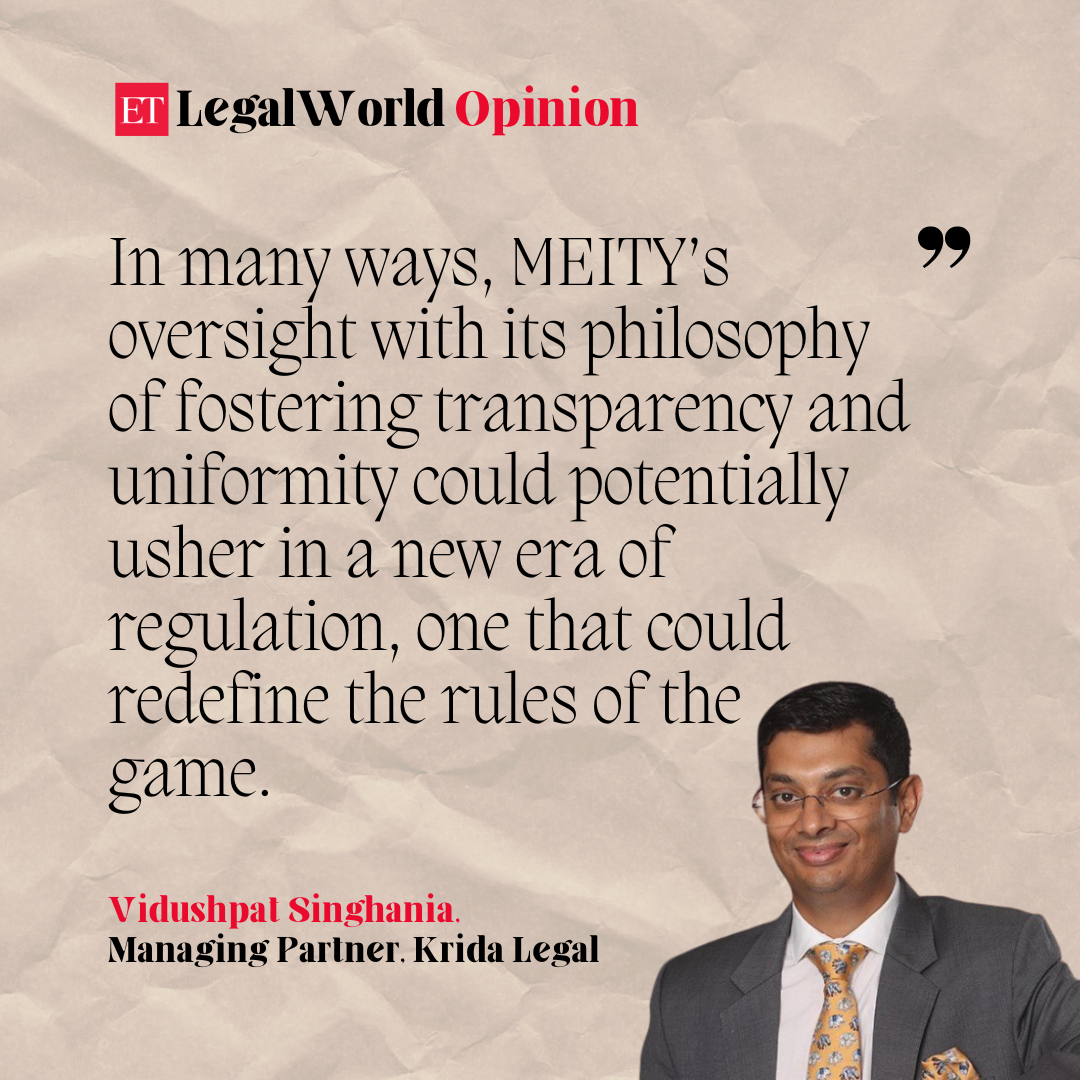The contours of the Indian Gaming Industry are undergoing a dynamic transformation with the central government taking significant steps to redefine its regulatory landscape. One such step is the appointment of the Ministry of Electronics and Information Technology (“MEITY“) as the central nodal ministry for online gaming. This appointment comes against the backdrop of a muddled pre-existing state-centric framework resulting in inconsistent state-specific criteria and non-uniform characterizations of what legal gaming activities would constitute. This was a scenario with which the online gaming industry has long grappled and sought clarification.

As its first order of business and in a bid to establish consistency, the MEITY introduced the Information Technology (Intermediary Guidelines and Digital Media Ethics Code) Amendment Rules, 2023 (“IT Rules 2023“) which further amended the Information Technology (Intermediary Guidelines and Digital Media Ethics Code) Rules, 2021 (“IT Rules 2021”), extending the ambit of these rules to gaming operators. The IT Rules 2023 provided key definitions that form the foundation of the new regulatory framework. “Online games” were defined as any games made available over the internet that users can access via a computer resource or through an intermediary. In contrast “online real money games” were defined as online games where users deposited money or its equivalent with the expectation of earning rewards or winnings based on such deposit. Furthermore, the term “permissible online game” was defined to mean ‘a permissible online real money game or any other online game that is not an online real money game’. Additionally, entities offering access to online games via computer resources were classified as Online Gaming Intermediaries (“OGIs”) and were mandated to comply with stringent obligations set forth by MEITY in order to offer “Permissible Online Games” in India. These included implementing a robust Know Your Customer (“KYC”) process, establishing effective grievance redressal mechanisms, and deploying safeguards to protect users from harm. The IT Rules 2023 also required the formulation of Self-Regulatory Bodies (“SRBs”) which would verify all permissible online games. However, while these rules touched upon the compliance involved in mechanisms to evaluate and approve games offered by operators and the ways through which the SRBs would identify a game as a “permissible online real money game”, they failed to provide any scope of regulation for games categorize as “impermissible”. That is to say that they did not differentiate between games of skill and games of chance, with respect to their legality. Interestingly, this decision involving the formation of SRBs was scrapped post-September 2023. The reason for the same was the fact that MEITY assessed that all the applications received by it for designation as SRBs were from bodies that were likely to be highly influenced by gaming operators. MEITY therefore announced that it would prescribe guidelines for regulation of online gaming in India which are awaited to this date.
The industry now finds itself at a crossroads. On one hand, MEITY’s involvement promises a more consistent regulatory environment, while on the other, its architecture tilted toward safeguarding user rights clubbed with the pre-existing high tax rates could disincentivize investment, pushing gaming operators out of the sector. Looking ahead, gaming operators can potentially expect clarity from MEITY on two major fronts, firstly, guidelines introducing uniform and transparent approval processes for offering permissible online games as well as differentiating between games of skill and games of chance, second removing any restriction on seeking to ban wagering, as most gaming involved wagering including licensed horse race betting and thirdly, recommendations pertaining to the potential harmonization of the IT Rules 2023 with state-specific legislations to prevent jurisdictional conflicts. Additionally, the Hon’ble Supreme Court’s pending decision on the applicability of the 28% GST rate across the sector also will significantly influence its overall financial viability.
Having closely observed the evolving contours of the gaming sector, the author believes that the path ahead will require collaboration among regulators, operators, and users alike in order to develop a regulatory framework that balances consumer protection, uniformity, and economic growth. In many ways, MEITY’s oversight with its philosophy of fostering transparency and uniformity could potentially usher in a new era of regulation, one that could redefine the rules of the game.
DISCLAIMER: The views expressed are solely of the author and ETLegalWorld does not necessarily subscribe to them. ETLegalWorld will not be responsible for any damage caused to any person or organisation directly or indirectly.


